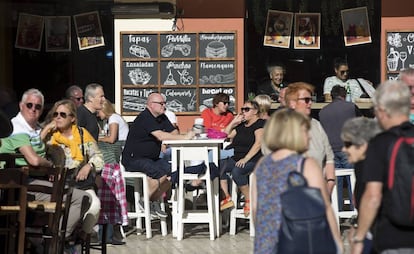Spanish city of Málaga calls time on new bars in bid to combat noise pollution
Local authorities have introduced a five-year ban on new dining and drinking establishments in downtown areas that are already saturated with venues

Sánchez Pastor street in downtown Málaga may be just 80 meters long, but it has 12 bars and restaurants as well as around 50 tables for al fresco drinking and dining. Close by, Calderería street has 16 watering holes scattered along its 113-meter length, and over on Ángel street, there are six on a 43-meter stretch.
The fact that it does not make anyone 100% happy is a sign that it is a balanced measure
City councilor Gemma del Corral
Over the next five years, these streets will be off limits to new food and drink venues as the city is not issuing any more licenses. The moratorium inside what are being termed Acoustically Saturated Zones (ZAS) encompasses a total of 103 streets where noise levels exceed 65 decibels during the day and 55 at night. In the worst cases, noise levels reach 90 decibels. “Getting rest is impossible,” complains Óscar Agudo, a local resident.
To comply with EU regulations, municipal authorities in the Andalusian city started to measure the noise levels on its streets more than 10 years ago. In 2016, the city published a map with the results and came up with several measures to reduce the noise in the worst-affected areas, including no licenses for new bars and restaurants in 98 streets around the city center and five more streets in the Teatinos university area. The measures, which are going into effect this January, also include earlier closing hours for establishments and fewer city-organized outdoor activities.
The new regulations were drawn up in the spirit of compromise, but have failed to please anyone. Javier de Frutos, president of the Málaga Hospitality Association, considers them “an interference in the free market in a key area of the city” that will have inevitable consequences: bar and restaurant owners fear job losses and giving a bad image to tourists. Meanwhile, those who have spent years complaining about the noise say that the measures are too little, too late, according to Alejandro Villén, the secretary of Málaga’s Historic Center Neighborhood Association.
City officials point out that they have acted in accordance with the regulation that obliges them to establish the ZAS areas. “The fact that it does not make anyone 100% happy is a sign that it is a balanced measure,” argues Gemma del Corral, the local councilor in charge of environmental sustainability policies.
Business owners fear job losses and giving a bad image to tourists
When municipal authorities recently analyzed the challenges of urban tourism in Málaga, a popular destination, they found that there was an “excessive concentration” of bars, restaurants and franchises in the old quarter. One in five ground-floor premises have been converted into bars or restaurants, according to a study carried out by the Observatory of Urban Environment (OMAU). This agency also noted that there has been an exodus of local residents from this area, particularly where late-night bars have flourished. “That’s where the biggest problems lie,” says Óscar Aguado. Residents of Mitjana square or Luis de Velázquez street have been complaining about the night-time noise for years, and blame much of it on the consumption of alcohol in non-designated outdoor areas, which is, in theory, prohibited by local bylaws.
Other measures aimed at reducing noise include the shutting of doors and windows in bars and restaurants after 11pm, and shorter opening hours for sidewalk cafés: from Sunday to Thursday they will have to close at 12.30am instead of 1am, and on Saturday night at 1am as opposed to 2am. During spring and summer, however, opening hours can be extended by half an hour.
Moreover, these business hours can be disregarded at other times of the year such as Easter and Christmas. In fact, there is a 20-day allowance when establishments can extend their closing times. This is down from the previous 70 days.
The city also aims to reduce the number of outdoor municipal activities in the center. “We are exercising self-restraint, “ says Gemma del Corral. “We all share the responsibility of reducing the noise pollution.”
English version by Heather Galloway.
Tu suscripción se está usando en otro dispositivo
¿Quieres añadir otro usuario a tu suscripción?
Si continúas leyendo en este dispositivo, no se podrá leer en el otro.
FlechaTu suscripción se está usando en otro dispositivo y solo puedes acceder a EL PAÍS desde un dispositivo a la vez.
Si quieres compartir tu cuenta, cambia tu suscripción a la modalidad Premium, así podrás añadir otro usuario. Cada uno accederá con su propia cuenta de email, lo que os permitirá personalizar vuestra experiencia en EL PAÍS.
¿Tienes una suscripción de empresa? Accede aquí para contratar más cuentas.
En el caso de no saber quién está usando tu cuenta, te recomendamos cambiar tu contraseña aquí.
Si decides continuar compartiendo tu cuenta, este mensaje se mostrará en tu dispositivo y en el de la otra persona que está usando tu cuenta de forma indefinida, afectando a tu experiencia de lectura. Puedes consultar aquí los términos y condiciones de la suscripción digital.









































